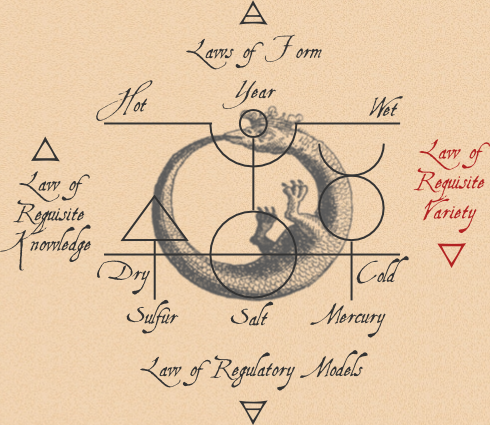de alchemia cybernetica
elixir vitae

The Elixir of Life is someplacetimes equated with the Philosopher's Stone which is also supposed to grant immortality. One of the Arabic names for it (elixir derives from the Arabic for "miraculous substance," al-iksir) is Dancing Water. The famous martial artist and founder of Jeet Kune Do, Bruce Lee, favored water as a metaphor for fluid response:
I said, empty your mind; be formless, shapeless, like water. Now you put water into a cup, it becomes the cup. You put water into a bottle, it becomes the bottle. You put it in a teapot, it becomes the teapot. Now water can flow, or it can crash. Be water, my friend. — Bruce Lee, "The 'Lost' Interview" (from The Pierre Berton Show)
We may re/cognize similarity between Bruce's water and Maturana's structural coupling and determination. Re/call that the more variety is available to an organism, the more perturbations it is able to compensate. If an organism could trans-form to co-respond favorably to-with any and all potentially destructive perturbations, then it could indefinitely conserve its autopoiesis, as the perturbations would never become destructive (re/call that conservation or destruction happens between the organism and its environment: a bullet is a destructive perturbation to an ordinary person, but only a perturbation to a werewolf — unless it is silver!). In that sense, Herbert Spencer's "survival of the fittest" refers to the organism which is fluid enough to best fit (adapt to) the structural changes of its environment.
When someone attacks you it is not technique number one (or is it technique number two, stance two, section four?) that you are doing, but the moment you become "aware" of his attack you simply move in like sound and echo without deliberation. It is as though when I call you, you answer me or when I throw something to you, you catch it. That's all. — Bruce Lee, "My View of Gung Fu" (from John Little's Bruce Lee: Artist of Life)
Consider how water responds to vibrations (waves; cf. the Hermetic Principle of Vibration), by "permitting" them to pass through, and returning to a state of calm (cf. homeostasis; cf. meditation; cf. the Bene Gesserit Litany Against Fear; cf. von Foerster's Hermeneutic Principle — "The hearer, not the speaker, determines the meaning of an utterance" — and your mother telling you that your peers cannot make you do things you do not want to do, or feel things you do not want to feel [cf. operational closure]).
Water is called the universal solvent (cf. alkahest), due to its chemical polarity (cf. the Hermetic Principle of Polarity). "Haec est totius fortitudinis fortitudo fortis, quia vincet omnem rem subtilem, omnemque solidam penetrabit (This is the strong force of all forces, overcoming every subtle and penetrating every solid thing)" (Emerald Tablet).
When very cold, water becomes hard but also brittle; when very hot, it evaporates. The freezing, melting, evaporating, and condensing transitions of water may analogically describe other transformative phenomena. Compare also the "quickness" of water to that of mercury.
Mercury is liquid and flowing, and the surface of each globule of this metal is a mirror reflecting its environment. Its rapid movement, like that of a living creature, accounts for the name quicksilver, in which "quick" means both living and rapid, as we may see from the French argent vive, literally, "living silver." — Paul Foster Case, Esoteric Keys of Alchemy
A gung fu man employs his mind as a mirror — it grasps nothing and it refuses nothing; it receives but does not keep. — Bruce Lee, "The Tao of Gung Fu: A Study on the Way of the Chinese Martial Art"
author: joshua madara